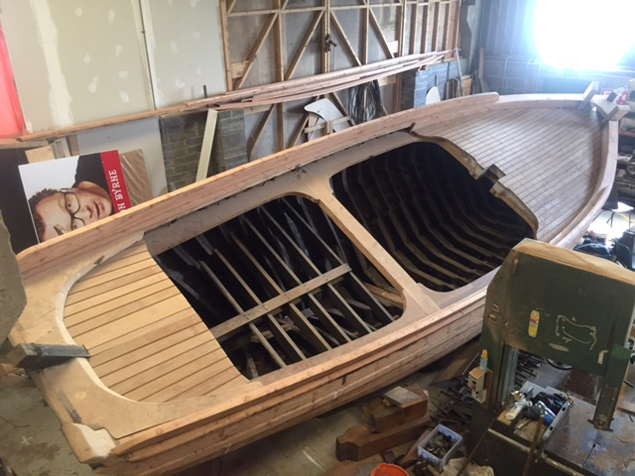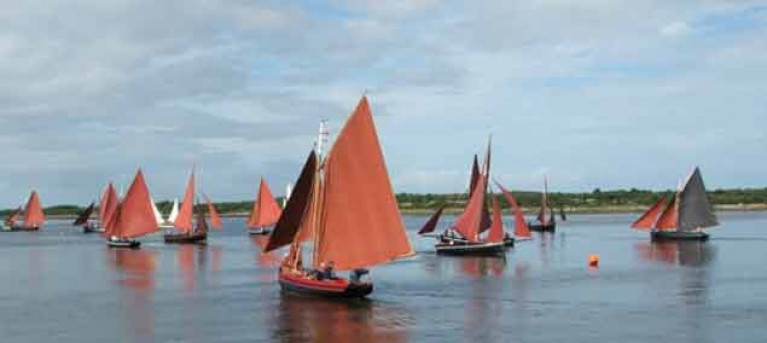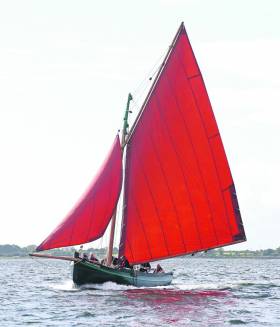Displaying items by tag: Cruinnui na mBad
Cancellation of Traditional Boats’ Cruinnui na mBad in Kinvara in August is Evidence of Continuing Covid-19 Threat
The annual Cruinnui na mBad (the Gathering of the Boats) at the very hospitable port of Kinvara in the southeast corner of Galway Bay is one of the most popular events in the western sailing programme, and it was hoped that this year’s from 14th to 16th August might be late enough in the season for the Covid-19 threat to have passed. However, the Organising Committee is chaired by Dr Michael Brogan, who may be best known in sailing circles for his extensive voyaging in the large ketch-rigged Galway hooker Mac Duach, and also for his input into last year’s voyage to Greenland by the Limerick ketch Ilen, but his experience as a GP working in Connacht gives him an added insight into the current situation. He and his committee reckon that the very high level of sociability afloat and ashore for three days in Kinvara may still pose an unacceptable risk in August, and the following statement was issued at 11.19 today:
Cruinnui na mBad 2020 Cancelled
In the interest of public health and safety, the Committee of Cruinniú na mBád have decided that sadly this years Regatta/ Festival on 14th to 16th August will not go ahead as planned.
In light of the present circumstance regarding Covid-19, due to the uncertainty regarding where we might be at in mid-August, the Committee have determined it would be irresponsible to bring large crowds to the village risking resurgence or spread of the virus, despite sailing being considered low risk.
2020 was to be our 41st Cruinniú na mBád and we want to thank all those who have supported us since our first Cruinniú in 1979, especially the Boat owners, crews and sponsors for their loyalty to the Festival.
We look forward to Cruinniú 2021
This weekend’s annual Cruinnui na mBad festival (the Gathering of the Boats) in Kinvara in the southeast corner of Galway Bay celebrates a tradition going back far into the mists of time writes W M Nixon. In the old days, it was a matter of necessity that the fleet of working Galway hookers in Connemara should sail up and across the bay, bringing the winter’s consignment of turf to a region where it’s a relatively scarce commodity.
The healthy mixture of commerce and effectively racing under sail, with festivities at the conclusion of a job well done, inevitably developed into a regatta atmosphere, West of Ireland style. So much so, in fact, that these days, the annual Cruinnui na mBad is a major event, which can attract a fleet of up to a hundred boats.
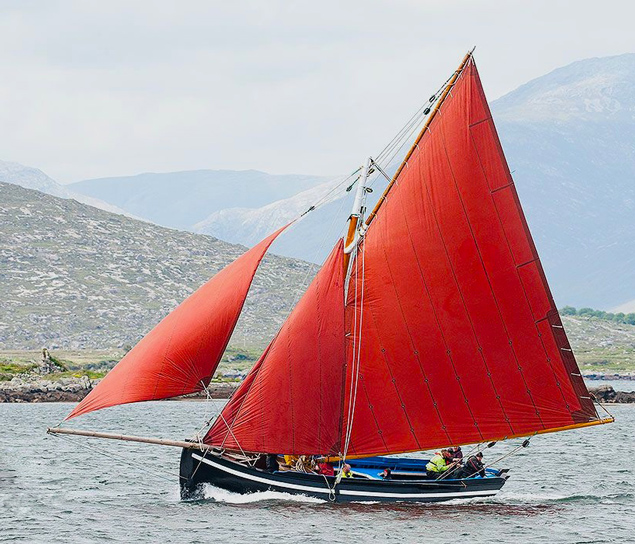 The spirit of Connemara. The Baily family’s classic An Capall making knots under a rugged western coastline
The spirit of Connemara. The Baily family’s classic An Capall making knots under a rugged western coastline
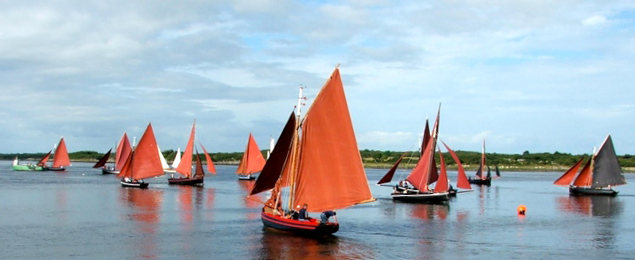 The Gathering of the Boats – some of the traditional fleet at Kinvara
The Gathering of the Boats – some of the traditional fleet at Kinvara
There’s now something extra to celebrate, as new boats to the traditional designs are being built at a steady rate by Colie Hernon and Peter Connolly and their team in Badoiri na Gaillimh in the Claddagh in Galway, and one of their creations is the central feature in the maritime display in the nearby City of Galway museum.
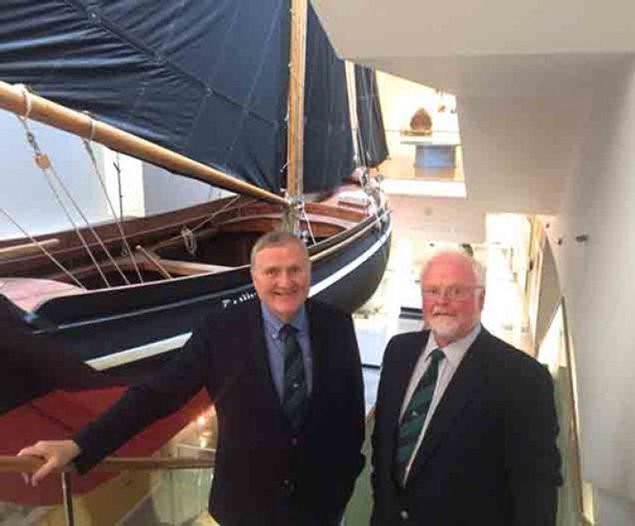 Jack Roy, President Irish Sailing (left) with Pierce Purcell of Galway and the traditional gleitog which is the centrepiece of the Maritime Section of Galway Museum.
Jack Roy, President Irish Sailing (left) with Pierce Purcell of Galway and the traditional gleitog which is the centrepiece of the Maritime Section of Galway Museum.
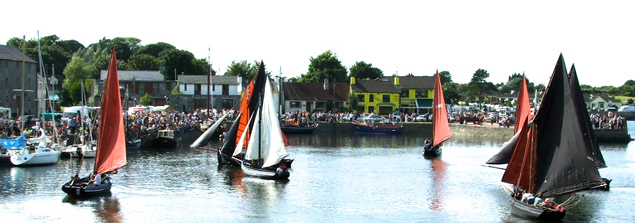 The fleet gathering at hospitable quayside in the heart of Kinvara
The fleet gathering at hospitable quayside in the heart of Kinvara
They are currently working on their seventh boat, a gleitog to be known as the Markeeen Joe. And a fine bit of work she is too, with completion anticipated for the Autumn. But they’ll be well represented by other craft they’ve built in Kinvara on Saturday and Sunday, when good weather is hoped to prevail until at least the middle of Sunday, and there’ll be no lack of proper sailing breezes.
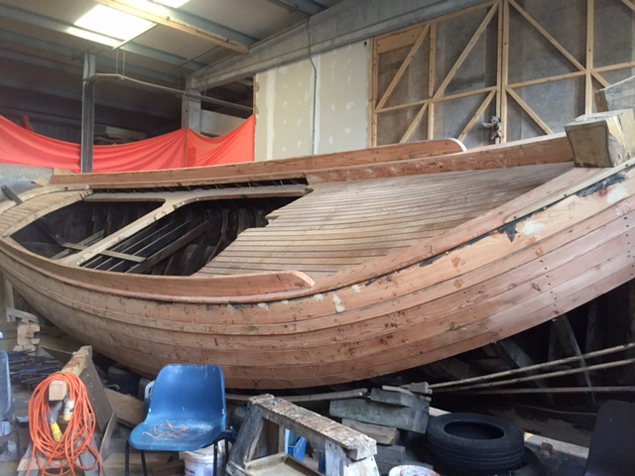 The new Markeen Joe under construction (above and below) in Galway city. Photo: Pierce Purcell
The new Markeen Joe under construction (above and below) in Galway city. Photo: Pierce Purcell